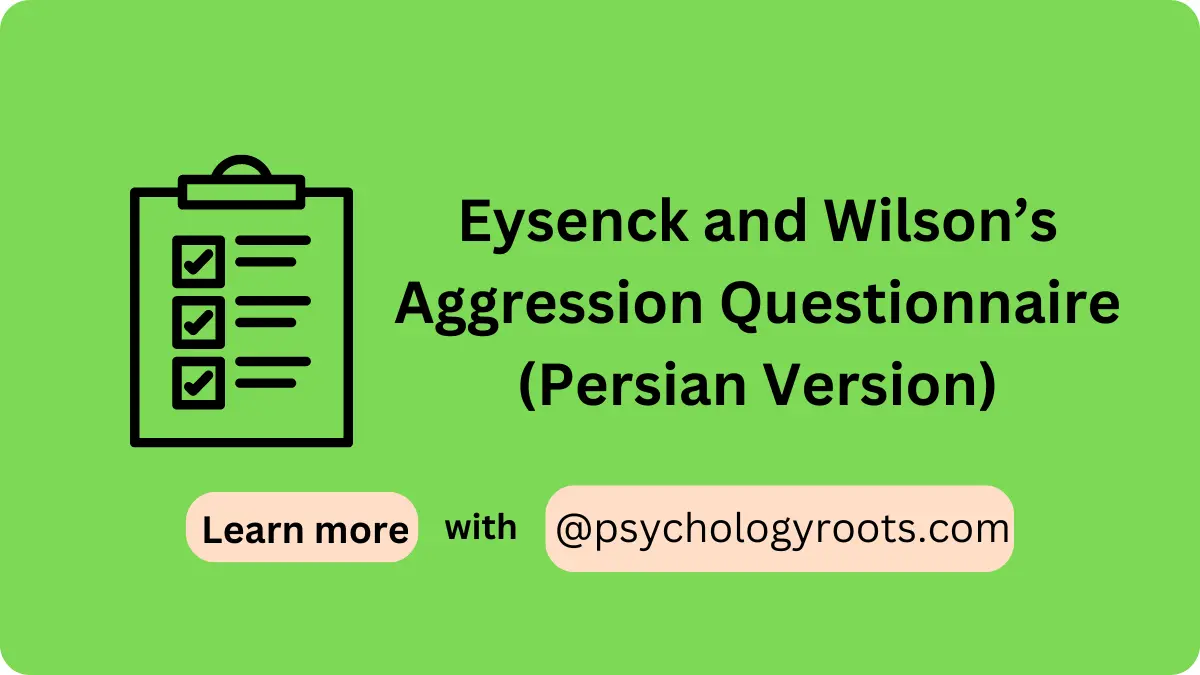Table of Contents
Eysenck and Wilson’s Aggression Questionnaire (Persian Version)
Here in this post, we are sharing the “Eysenck and Wilson’s Aggression Questionnaire (Persian Version)”. You can read psychometric and Author information. We have thousands of Scales and questionnaires in our collection (See Scales and Questionnaires). You can demand us any scale and questionnaires related to psychology through our community, and we will provide you with a short time. Keep visiting Psychology Roots.
About Eysenck and Wilson’s Aggression Questionnaire (Persian Version)
Scale Name
Eysenck and Wilson’s Aggression Questionnaire (Persian Version)
Author Details
Hans Eysenck & Glyn Wilson
Translation Availability
English

Background/Description
he Eysenck and Wilson’s Aggression Questionnaire is a widely used measure to assess levels of aggression across various dimensions, including physical aggression, verbal aggression, anger, and hostility. This tool is grounded in the theory of personality developed by Hans Eysenck, which links aggression to broader personality traits such as extraversion and neuroticism.
The Persian version of this questionnaire was adapted for use in Persian-speaking populations, ensuring cultural relevance while maintaining the questionnaire’s psychometric properties. The adaptation allows researchers and clinicians to assess aggression in a more linguistically and culturally appropriate manner for individuals in Iran or other Persian-speaking regions.
Administration, Scoring and Interpretation
- The questionnaire is designed for adolescents and adults in both clinical and research settings. The Persian version is intended for Persian-speaking individuals.
- The Aggression Questionnaire consists of a series of self-report items on a Likert scale. Participants rate how often they engage in specific aggressive behaviors or experience aggressive feelings.
- The questionnaire is typically administered in paper or digital format. Participants are asked to respond to statements such as, “I get angry when things don’t go my way,” indicating how often these statements apply to them.
- The scoring is based on the degree to which participants agree with each statement. Higher scores on the physical aggression and verbal aggression subscales indicate more frequent aggressive behaviors. Similarly, higher scores on the anger and hostility subscales reflect greater emotional reactivity and resentment.
- The results can help clinicians and researchers understand an individual’s aggression profile, which may be useful in therapeutic settings or when exploring personality traits related to aggression.
Reliability and Validity
The Persian version of the questionnaire has undergone validation studies to ensure that it reliably measures aggression in Persian-speaking populations. These studies have confirmed that the factor structure, reliability, and validity of the Persian version are comparable to the original English version.
- Reliability: The Persian version demonstrates high internal consistency across its subscales, making it a dependable measure of aggression.
- Validity: The scale’s construct validity has been supported by its correlations with other measures of aggression, as well as related personality traits such as neuroticism and hostility.
Available Versions
30-Items
Reference
Eysenck, H. J., & Eysenck, S. B. G. (1975). Manual of the Eysenck Personality Questionnaire (junior & adult). Hodder and Stoughton Educational.
Servatyari, K., Yousefi, F., Kashefi, H., Bahmani, M. P., Parvareh, M., & Servatyari, S. (2018). The relationship between parenting styles with the aggression of their children in sanandaj primary students. International Journal of Biomedicine and Public Health, 1(3), 141-147.
Important Link
Scale File:
Frequently Asked Questions
Q: What does the Eysenck and Wilson’s Aggression Questionnaire measure?
A: The questionnaire measures physical aggression, verbal aggression, anger, and hostility, providing insights into an individual’s aggressive tendencies.
Q: Who can use the Persian version of this questionnaire?
A: The Persian version is intended for use with Persian-speaking adolescents and adults in both research and clinical contexts.
Q: How is the questionnaire scored?
A: The questionnaire is scored based on participants’ self-reported frequency of aggressive thoughts, feelings, and behaviors. Higher scores indicate more frequent aggression.
Q: What are the practical applications of this scale?
A: This scale is used in clinical psychology, forensic settings, and research to assess individuals’ aggression levels and identify potential interventions.
Q: How long does it take to complete the questionnaire?
A: The questionnaire typically takes about 10-15 minutes to complete, depending on the individual.
Disclaimer
Please note that Psychology Roots does not have the right to grant permission for the use of any psychological scales or assessments listed on its website. To use any scale or assessment, you must obtain permission directly from the author or translator of the tool. Psychology Roots provides information about various tools and their administration procedures, but it is your responsibility to obtain proper permissions before using any scale or assessment. If you need further information about an author’s contact details, please submit a query to the Psychology Roots team.
Help Us Improve This Article
Have you discovered an inaccuracy? We put out great effort to give accurate and scientifically trustworthy information to our readers. Please notify us if you discover any typographical or grammatical errors.
Make a comment. We acknowledge and appreciate your efforts.
Share With Us
If you have any scale or any material related to psychology kindly share it with us at psychologyroots@gmail.com. We help others on behalf of you.